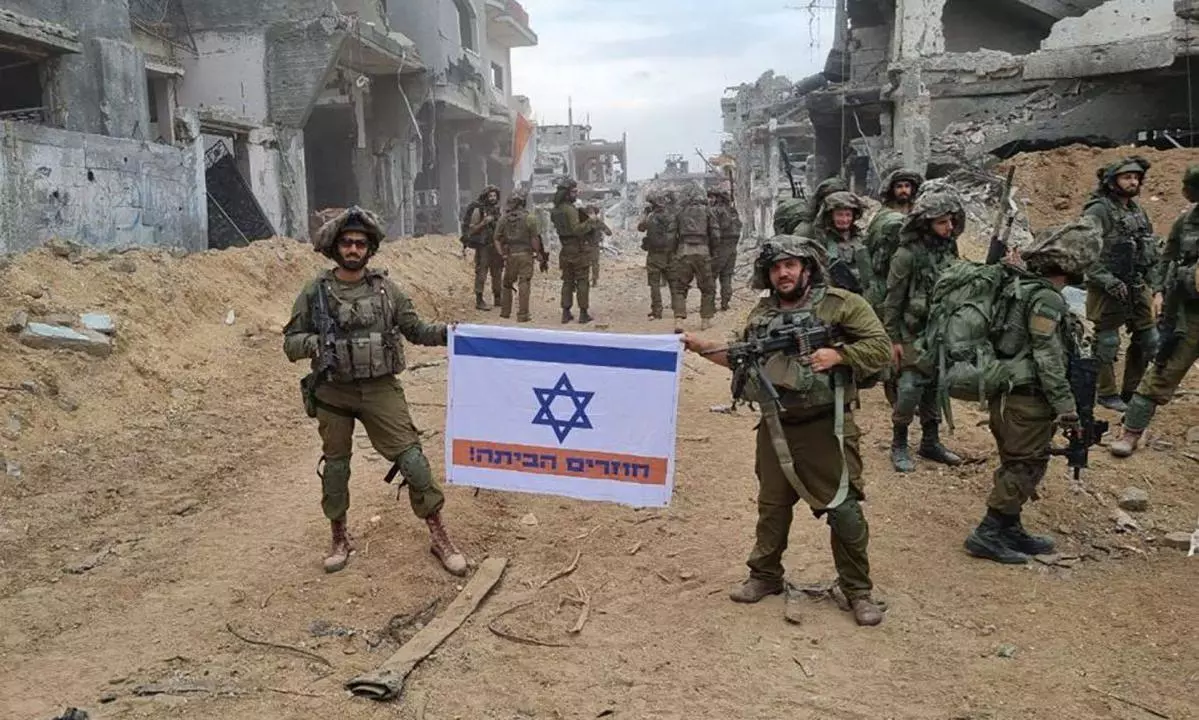
Israeli forces declare they won’t allow Palestinians to return to northern Gaza
text_fieldsOfficially declaring their intention to occupy more Palestinian territories, the Israel Defense Forces (IDF) have announced that Palestinian residents will not be allowed to return to their land in northern Gaza amid intensified operations aimed at the ‘complete evacuation’ of the region.
This is the first time Israel has formally acknowledged an effort to systematically remove Palestinian civilians from northern Gaza, indicating a significant escalation in the ongoing conflict.
The IDF’s operations in Gaza’s northern areas, including sites like the Jabaliya refugee camp, aim to dismantle remaining Hamas cells. However, the extensive ground campaign has raised international concerns about humanitarian impacts, with experts warning that forcibly transferring civilians and restricting food access could constitute war crimes under international law.
Israeli authorities have allowed humanitarian aid into southern Gaza, but with northern Gaza deemed largely “devoid of civilians,” aid will not be extended there.
Despite these measures, the Israeli government has consistently denied pursuing an evacuation strategy for Gaza’s northern population, maintaining instead that these efforts are essential for neutralising Hamas’ presence.
Reports from within northern Gaza reveal deteriorating conditions, with remaining residents facing dire food shortages and intensified bombardment. Rights organisations and aid groups have argued that these actions align with a pre-existing Israeli military approach, which grants civilians limited time to evacuate before treating any remaining individuals as potential combatants.
Recent estimates suggest approximately 400,000 civilians were in northern Gaza as of last month, though their current status is uncertain. Video footage from Wednesday showed groups of displaced families journeying south through heavily bombed areas, carrying few possessions. Witnesses described desperate conditions, lacking food, water, and even basic footwear.
Amid ongoing Israeli airstrikes, northern areas continue to experience severe casualties. In the northern town of Beit Lahiya, at least 15 people reportedly died following an airstrike on Wednesday, though communications challenges in Gaza have made official casualty counts difficult. Medical facilities in the area, already struggling with resource limitations, have come under fire, further complicating efforts to provide care for those affected.
Earlier this year, Israel effectively divided Gaza by creating the Netzarim corridor, cutting off Gaza City from the rest of the territory. In its latest operations, the IDF has now isolated Gaza City from more rural northern regions, a move that intensifies the city’s detachment and confines potential escape routes.
Although the Israeli government’s official stance does not support the reoccupation or resettlement of Gaza, some officials have hinted at a potential annexation of significant portions of the territory. This development, if pursued, could indicate a lasting shift in Israel’s approach to the Gaza Strip.
Simultaneously, the conflict has escalated along Israel’s northern front with Lebanon. An Israeli airstrike targeted the Lebanese town of Barja, near Beirut, killing at least 30 people, including numerous women and children. This attack marks the second strike on the town, which has become a refuge for thousands displaced from southern Lebanon due to ongoing Israeli bombardment. The assault has stoked fears among Barja’s residents, who worry that providing shelter to the displaced may increase their own risk of further strikes.
Hezbollah has retaliated by launching a barrage of rockets at Israeli cities, including Tel Aviv. Hezbollah’s leadership has asserted that the group is prepared for prolonged hostilities, indicating that they intend to sustain a strategic defensive stance. Although open to a ceasefire, Hezbollah has outlined specific conditions that Israel would need to meet to halt the current escalation.






















